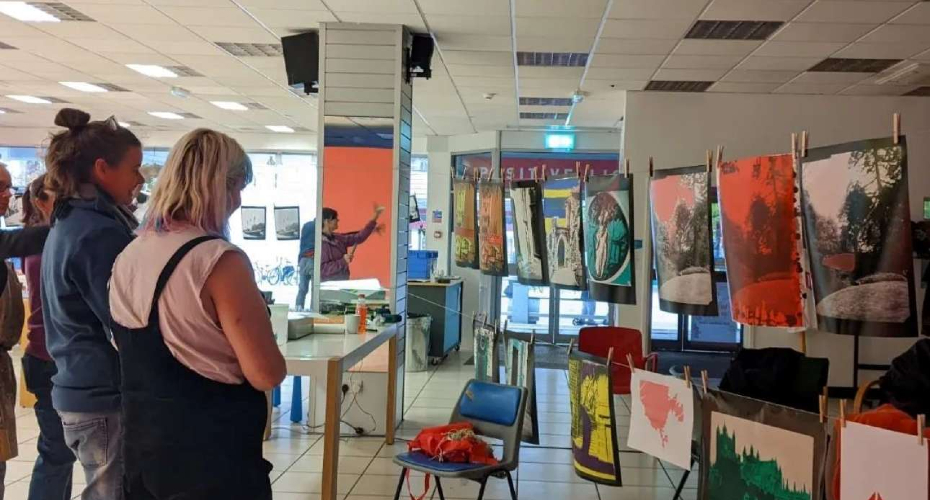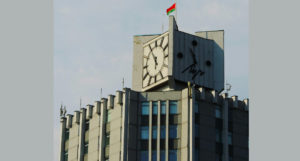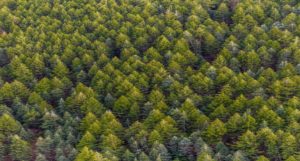Invisible landmarks, magic lanterns and digital technologies brought to life by the University of Exeter at national festival

The relationship between Exeter’s landscapes and landmarks and the technologies used to capture them – both historic and cutting edge – will be the focus of three engaging events taking place as part of a national festival during November.
Members of the public will be able to access a new and interactive web-based city-map that incorporates the first aerial photos of the city, and experiment with magic lantern slides from the 19th century during two public events run by the University of Exeter.
And school children will be offered a hands-on demonstration of the way digital technology is imbuing new life into historical artefacts during the third session, which are all part of Being Human – the UK’s free festival of the humanities.
The events, taking place between the 7th and 9th of November, are being coordinated by academics in the University’s Archaeology, English and Digital Humanities departments.
Historic Exeter from the Air, which will be held at Exeter Innovation Hub in the Princesshay Shopping Centre on 9 November, will showcase a new web-based app called Exeter Time Machine, which enables users to walk through Exeter’s cityscape through the lens of different historical ‘layers’.
Created by Dr Adrian Oyaneder in the University’s Digital Humanities Lab in collaboration with Devon County Council’s Historic Environment Office, the app is designed to be used on a smartphone via web browser and will provide location-based information on hidden city landmarks. It features the first aerial photographs of Exeter taken from a hot-air balloon at the beginning of the 20th century, as well as maps dating from the 1940s.
During the session, visitors will be shown how to access and use Exeter Time Machine, and there will be activities and discussions around several digital and table-top displays of real objects and materials.

Projecting the Past: Remaking Local Landmarks, on 7 November, offers a creative workshop for families on magic lanterns – a popular form of 19th century cultural entertainment that enabled images and photos to be projected in an age before film and television.
Co-curated by hosts Positive Lights Project, and the Bill Douglas Cinema Museum, the event will enable participants to view slides held by the museum through some genuine antique magic lanterns, before having the opportunity to create some paper negatives of their favourite slides to take home.
“One of the most common uses of photography in the 19th century was to document the local world, to record and visualize local landmarks such as landscapes, buildings and high streets,” says Professor John Plunkett, lead for the event and a renowned researcher on visual media from the era, “These photographs were often turned into lantern slides and projected to audiences, who enjoyed listening to lantern lectures about their local areas. So, they played a key role in the creation of local landmarks – and through this event, we will have the chance to creatively remake them from a contemporary perspective.”
The final event is called A Digital Future For Our Past, and will be held at Stoke Hill Junior School in the city on 8 November. Professor Oltean and the team from the University’s Digital Humanities Lab will demonstrate how digital technologies are revolutionising the curation of physical artefacts and landscapes.
Techniques such as photogrammetry and 3D scanning will be demonstrated, and the pupils at the school will explore some of the digital copies of rare artefacts stored at the University, including Grecian urns. They will also create a 3D model of their new school mascot.
“The aim of these three activities at the Being Human festival is to create better connections between people and Exeter’s past, between landmarks of history and the modern media that can bring them to life,” says Professor Ioana Oltean, a specialist in the archaeology of the Roman Empire and in aerial archaeology, and event series coordinator for the University. “At a time when the narrative around digital technologies is often negative, we want to demonstrate how they are playing a positive role in preserving memory and curating heritage.”
For more details of the events, visit the Being Human Festival 2024 website.



